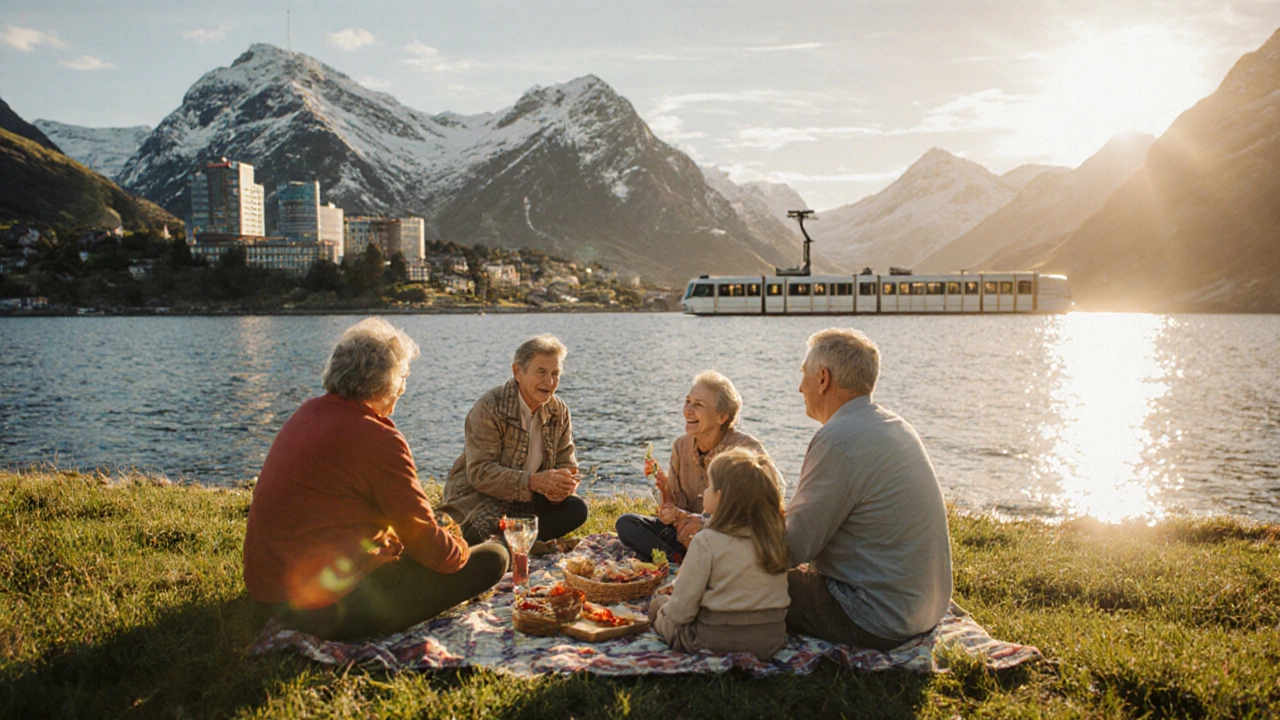
Quality of Life Country Matcher
Your Priorities
Select the factors that matter most to you when choosing a place to live. We'll recommend the best countries based on your preferences.
Top Countries for 2025
Based on the seven key quality of life metrics, here are the top-ranking nations:
- Norway (Rank 1): Healthcare 96/100, Education 94/100, Safety 9.5/10
- Switzerland (Rank 2): Healthcare 98/100, Education 92/100, Safety 9.4/10
- Denmark (Rank 3): Healthcare 95/100, Education 93/100, Safety 9.6/10
- Canada (Rank 4): Healthcare 92/100, Education 90/100, Safety 9.1/10
- New Zealand (Rank 5): Healthcare 90/100, Education 88/100, Safety 9.3/10
Recommended Country
Select your priorities and click "Find My Perfect Country" to see your personalized recommendation.
Why This Match?
Your selected criteria will determine the best match based on the 2025 quality of life rankings.
Quick Tips
- Consider hidden costs like property taxes and luxury goods
- Check visa requirements before relocating
- Research language barriers if not fluent in the local language
- Experience the climate before making a final decision
Quick Takeaways
- Norway, Switzerland, and Denmark consistently rank at the top for overall quality of life.
- Key factors include healthcare, education, safety, cost of living, and work‑life balance.
- If you prioritize low taxes over public services, the United Arab Emirates and Singapore score high.
- Climate lovers may favour New Zealand or Canada, while urban enthusiasts often choose the Netherlands.
- Use the comparison table below to match your personal priorities with the right country.
When people ask what the best country to live in looks like, they’re really hunting for a place where daily life feels safe, affordable, and fulfilling. The answer isn’t one‑size‑fits‑all; it hinges on which factors matter most to you. Below we break down the most common criteria, score the world’s top performers for 2025, and give you a clear roadmap to decide which nation matches your lifestyle.
How Experts Measure "Best" - The Core Metrics
All reputable rankings start with a handful of measurable attributes. Each attribute is a quality of life index a composite score that blends health, education, safety, and economic wellbeing. Here’s a quick look at the seven pillars most analysts agree on:
- Healthcare system access to affordable, high‑quality medical care
- Education system quality of primary, secondary, and higher education
- Safety index crime rates, political stability, and personal security
- Cost of living price of housing, food, transport, and taxes
- Work‑life balance average working hours, vacation policies, and flexible work options
- Climate temperature range, precipitation, and natural disaster risk
- Cultural openness acceptance of diversity, language access, and expatriate community size
Every country scores differently across these pillars, creating a unique quality‑of‑life fingerprint.

2025 Ranking Snapshot - The Top 7 Nations
| Country | Healthcare Score (out of 100) | Education Score | Safety Index | Cost of Living Rank | Work‑Life Balance | Overall Rank |
|---|---|---|---|---|---|---|
| Norway Scandinavian nation with universal health care and low crime | 96 | 94 | 9.5 | 13 (higher = more expensive) | 9.2 | 1 |
| Switzerland Alpine country known for premium health services | 98 | 92 | 9.4 | 14 | 8.8 | 2 |
| Denmark High happiness scores and generous parental leave | 95 | 93 | 9.6 | 12 | 9.4 | 3 |
| Canada Large landmass with strong public services | 92 | 90 | 9.1 | 10 | 8.5 | 4 |
| New Zealand Island nation praised for safety and scenery | 90 | 88 | 9.3 | 9 | 8.9 | 5 |
| Netherlands Bicycle‑friendly with strong expat community | 93 | 91 | 9.2 | 11 | 9.0 | 6 |
| Singapore City‑state with low taxes and world‑class infrastructure | 94 | 89 | 9.0 | 8 | 8.2 | 7 |
The numbers come from the United Nations Human Development Report, the Economist Intelligence Unit, and local statistical agencies. Notice how the “Cost of Living Rank” works-lower numbers mean cheaper everyday expenses, while a higher rank signals a pricier environment.
What’s Your Priority? Matching Personal Needs to a Country
Below are five common life scenarios and the country that shines brightest for each.
- Family‑focused, generous parental leave: Denmark offers 52 weeks of partially paid leave and world‑class preschool.
- High‑earning expat with low tax burden: Singapore caps personal income tax at 22% and has a streamlined residency process.
- Nature lover who wants safety and clean air: New Zealand scores top marks for environmental quality and has a low crime rate.
- Tech professional seeking vibrant startup ecosystem: Canada (especially Toronto and Vancouver) provides generous R&D tax credits and a multicultural workforce.
- Retiree on a budget who still wants good health care: Portugal (not in the top‑7 list but close) offers affordable housing, a public health system, and a warm climate.
Potential Pitfalls - What the Rankings Don’t Show
Numbers are helpful, but they can hide real‑world challenges. Keep these warnings in mind before you pack your bags:
- Language barriers: Even in English‑friendly nations like the Netherlands, official documents may be in Dutch, affecting bureaucracy.
- Hidden costs: High‑ranked countries often charge steep taxes on property, cars, and luxury goods. A “low cost of living” rank might ignore these non‑recurring expenses.
- Weather impact on health: Dark, long winters in Norway can affect mood; seasonal affective disorder is a genuine concern.
- Visa and residency hurdles: Nations like Switzerland require a job offer and cantonal approval, which can take months.
- Cultural fit: Social norms in Scandinavia prioritize privacy and punctuality-if you thrive on a more relaxed vibe, you might feel out of place.

How to Take the Next Step - A Practical Checklist
After you’ve identified a shortlist, run through this quick checklist to verify the move makes sense for you.
- Confirm your visa eligibility (work permit, skilled migration, or family reunification).
- Calculate the total cost of relocation: moving fees, initial housing deposit, and any mandatory health insurance.
- Research the local education system if you have children-public vs. private options, language of instruction, and school catch‑ment zones.
- Arrange a short‑term visit (2‑4 weeks) to experience daily life, commute, grocery prices, and social interactions.
- Set up a banking solution that works internationally, and learn about tax treaties to avoid double taxation.
Crossing each of these boxes will give you confidence that the "best" country you’ve chosen truly aligns with your personal and financial goals.
Frequently Asked Questions
Which country offers the cheapest cost of living among the top rankings?
Among the 2025 top‑7 list, Portugal (just outside the top bracket) and the United Arab Emirates provide the lowest overall expenses for housing and groceries, while still maintaining strong health and safety scores.
Do these rankings consider climate preferences?
Yes, the climate pillar evaluates temperature stability, daylight hours, and natural disaster risk. Countries like New Zealand score high for moderate weather, whereas Norway’s colder climate lowers its overall appeal for those who dislike long winters.
Can I work remotely from any of these top countries?
Remote work is generally allowed, but you’ll need a digital nomad visa or a residence permit that explicitly permits freelance activity. Singapore, Portugal, and Estonia (not in the top‑7 but popular for digital nomads) have clear pathways for remote workers.
How reliable are the safety scores for these countries?
Safety scores compile data from crime statistics, political stability indexes, and citizen surveys. Nations like Norway, Denmark, and New Zealand consistently report low violent crime rates and high public trust in law enforcement.
What about language barriers for expats?
English proficiency is high in Scandinavia, the Netherlands, and Singapore, making daily life easier for English‑speaking expats. In Portugal and Canada, bilingual services are common, but learning the local language speeds up integration.
Bottom Line
There’s no single "best country" that fits everyone. By focusing on the seven quality‑of‑life pillars, checking the detailed table, and matching your personal checklist, you can pinpoint the nation that feels like home. Whether you crave pristine nature, top‑tier public services, or low taxes, the data above gives you a solid launchpad for a well‑informed move.